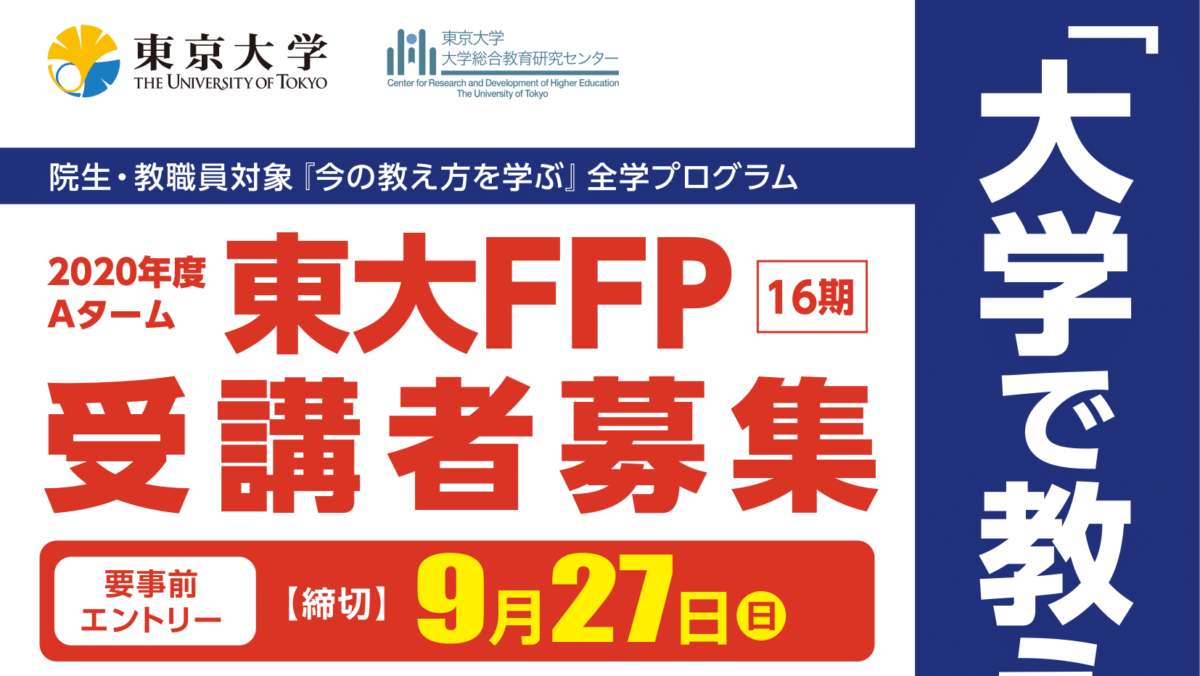Center for Research and Development of Higher Education, The University of Tokyo is delighted to announce that the application is open for the following program related to UTokyo FFP (The University of Tokyo Future Faculty Program). We look forward to your application.
Training Program for Pre-FD* Instructors
*FD: Faculty Development
[Goals] To be able to plan and conduct pre-FD programs based on the framework of UTokyo FFP, or to acquire knowledge and skills in planning and conducting programs affiliated with UTokyo FFP.
[Schedule] Eight classes in total (Please refer to the following for a detailed schedule.)
[Delivery] Live online via Zoom
[Target Participants] Faculty at centers outside the University of Tokyo (those who are in charge of pre-FD programs or planning to affiliate with UTokyo FFP); Senior high school teachers (Those who aim to plan practical teacher training programs to realize a new type of learning based on the new Curriculum Guidelines)
[Instructors] Kayoko Kurita and Lui Yoshida (Center for Research and Development of Higher Education, The University of Tokyo)
[Capacity] About four people (including one senior high school teacher)
[Fee] Free of charge
[Certificate] None
[Application Period] Starts on September 9th, 2020.
[Application Form] Please apply from the form below.
https://forms.gle/ReQKwFaJAxvC6hcB7
[Application Deadline] Sunday, September 27th, 2020, 11:59 PM
[Selection]
・Selection will be made based on the information filled in the form on the motive for application and concreteness of the plan.
・Applicants will be notified of the results individually by September 29th, 11:59 PM.
[Qualifications]
・Those who can attend all the sessions (eight in total). (Please refer to the following for a detailed schedule.)
[Outline] Participation in the eight sessions of UTokyo FFP as described below (01:00–04:40 PM, 220 minutes including a break per session) as observers and in the following workshops (for about two hours) will provide the participants with learning opportunities as mentors of pre-FD and FD programs.
[Program Overview]
<UTokyo FFP Curriculum>
For more details, please refer to the webpage (https://dev2.utokyofd.com/en/ffp/about/) and the syllabus shown on the same page.
The sessions (DAY 1–DAY 8) will be the same on Thursday and Friday in principle. Period: 01:00–04:40 PM (including a break)
DAY 1 (Oct. 1 or Oct. 2) Present situation of higher education, exercise on research presentations, and overview of UTokyo FFP
DAY 2 (Oct. 8 or Oct. 9) Class design principles, motivation, and active learning strategies
DAY 3 (Oct. 22 or Oct. 23) Evaluation and exercise in creating rubrics
DAY 4 (Nov. 5 or Nov. 6) Course design and exercise in improving a text syllabus and creating a graphic syllabus
DAY 5 (Nov. 19 or Nov. 20) Exercise in giving feedback on lectures for microteaching (the practice of peer evaluation) and review of learning materials so far (exercise in conducting a poster tour)
DAY 6 (Dec. 3 or Dec. 4) Microteaching session (1) (examination of the lectures for further refinement in small groups)
DAY 7 (Dec. 17 or Dec. 18) Microteaching session (2) (conducting the lectures refined through Microteaching session (1))
DAY 8 (Jan. 8 or Jan. 14) Creating a Structured Academic Portfolio (SAP) chart (Envisioning one’s career path)
<Workshops>
Two-hour workshops will be held on Friday after UTokyo FFP sessions (Oct. 2, Oct. 9, Oct. 23, Nov. 6, Nov. 20, Dec. 4, Dec. 18, and Jan. 14).
Participants will be working on discussions on class design, microteaching sessions, and the administrative system of each UTokyo FFP session from the perspective of instructors and will examine their plans for the programs to be conducted at their own universities.
If you have any questions, please contact us via the Inquiry Form.













